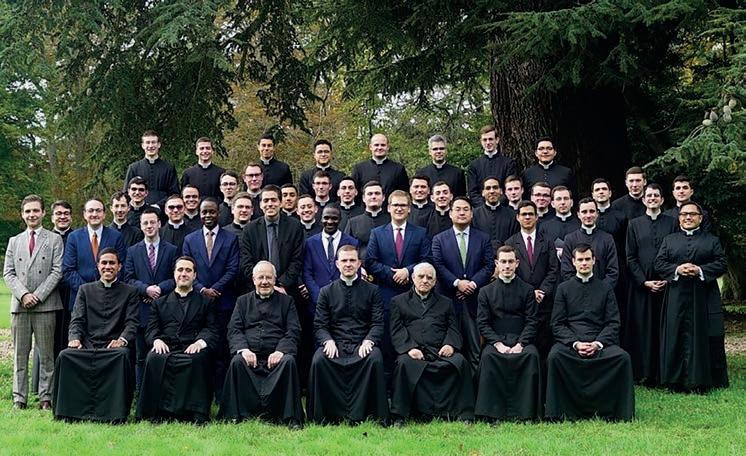
4 minute read
World News Paul Waddington reports on what’s happening around the Globe
The Priestly Fraternity of St Peter and the Institute of Christ the King Sovereign Priest (ISKSP) are well known in England and Wales as Orders of Priests with the charism of offering the traditional Mass in Latin. Perhaps less well known to our readers is the Institute of the Good Shepherd, which is also a Society of Apostolic Life operating on an international scale and exclusively using the 1962 Missal.
Founded in 2006, it has its headquarters and seminary at Courtalain in Northern France. Currently it has 62 priests, four deacons and 44 seminarians. Ten young men of six different nationalities entered the first (or propaedeutic) year of their studies last autumn, bringing the number of nationalities represented in the Order to fifteen. The Institute has Apostolates in France, Italy, Poland, Uganda, Brazil, Columbia and the United States.
Philippines
With a Catholic population of over 85 million, representing more than 80 percent of the total population, the Philippines is one of the most Catholic countries in the world. In the whole of the Philippines, there are only nine locations where the Traditional Mass is offered on Sundays, with weekday Masses offered at a further four locations. For a country with such a big Catholic population, this is very poor provision.
The Archdiocese of Cebu is the largest diocese in the Philippines (and indeed in Asia) with an estimated five million faithful. Until recently, it had just one Latin Mass, which was offered in a monastery. It was reported that young people were flocking to this Mass in increasing numbers.
In December, it was announced that this Mass was to be suspended, “pending further discussion and until such time that we can come up with clear guidelines and regulations on these Masses”. The announcement was made in a letter written on behalf of the Archbishop of Cebu, Jose Palma, and signed by the Chancellor of the Archdiocese. The cessation of this regular Sunday Mass is one of the most devastating consequences of Traditiones Custodes, as there is no other Mass in the traditional rite that the faithful of Cebu can attend.
Spain
Spain is another country where Latin Mass provision is poor. According to official statistics, there are around 30 million Catholics in Spain, which is roughly 66 percent of the overall population. The Traditional Latin Mass is offered on Sundays at 23 locations, with weekday Latin Masses at a further ten locations. This works out at approximately one location per million Catholics. In England and Wales, the traditional Mass is offered at about 23 locations for every million Catholics. However, despite these unimpressive statistics, there is some good news coming out of Spain. The Priestly Fraternity of Saint Peter has recently established its first foundation in that country at the small town of Jerez de la Frontera in the south of Spain. The Institute of Christ the King Sovereign Priest have been established in Spain for much longer, with their headquarters in Madrid. They offer Latin Masses at eight locations, although some are not every Sunday.
France
Bishop Dominique Rey of the Diocese of Frejus-Toulon in southern France tendered his resignation in early January, reportedly at the request of the Holy Father. Since his appointment in the year 2000, Bishop Rey has ordained a large number of priests, and welcomed many religious Orders into his diocese, including many from outside the bounds of the diocese. Some, but by no means all, of these incomers have shown traditional tendencies.
In 2022, the Vatican imposed a moratorium on ordinations in the diocese. A year later, the diocese was subject to an apostolic visitation, reportedly prompted by questions over financial management, and accusations that Rey had an authoritarian governing style.
Following the visitation, Pope Francis appointed Bishop François Touvet as coadjutor bishop with wide powers of governance. The veto on ordinations was subsequently lifted, enabling the backlog of ordinations to be dealt with. However, ordinations in the traditional rite that some had been expecting, continued to be banned.
The resignation of Bishop Rey followed the removal of Bishop Joseph Strickland of Tyler in Texas, who was also removed following an apostolic visitation. In both cases, the justification for the visitation concerned issues around the governance of the diocese.











